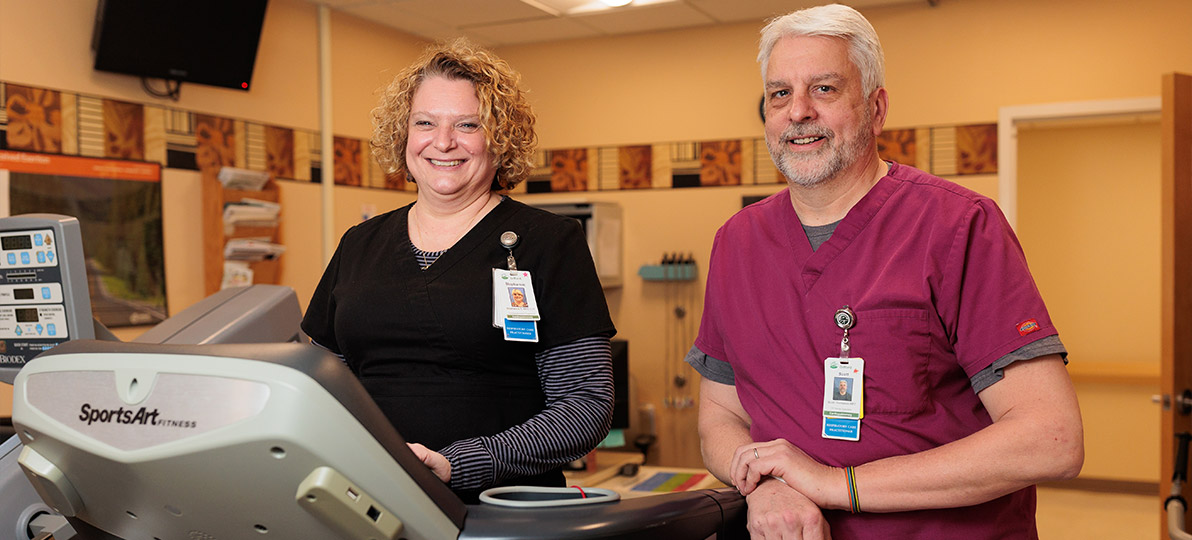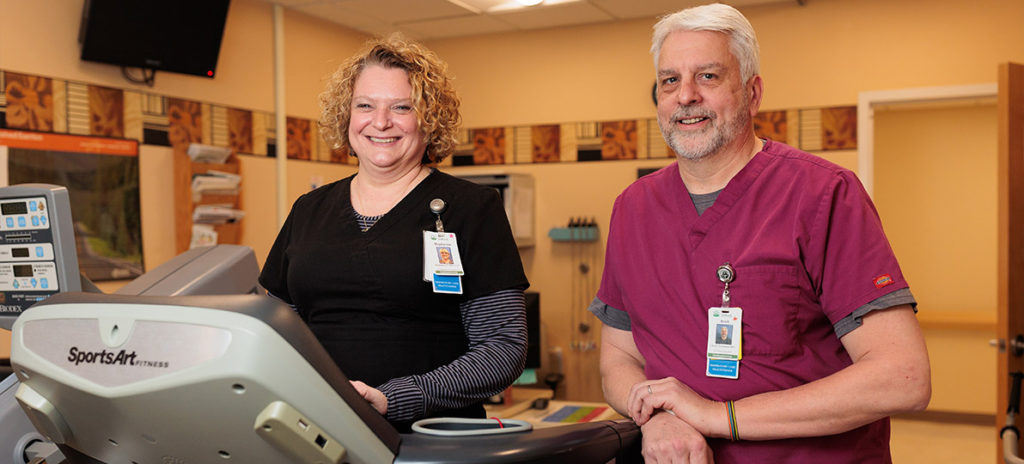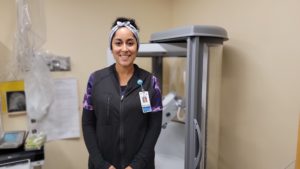

Gifford’s Cardiopulmonary team members Stephanie Sharbonneau and Scott Thompson share like with any rehabilitation program, cardiac rehabilitation includes a combination of education and exercise to help heart patients return to a healthy, active life.
The Heart to Keep Pushing
All Justin Merrill wanted to do this fall was hunt for elk in the high elevation of Colorado. It was something he and his friends had been planning for months. However, that goal was in jeopardy over the summer after the Berlin resident had a stent placed in his heart.
“Once it was determined that I would be getting the stent procedure done, I was definitely a bit nervous about it,” Merrill said.
In March of 2021, during a golf tournament on Lake Champlain, Merrill noticed he was having trouble breathing as he made his way to each hole. His chest was also feeling tight. The next day while helping a friend move some hay bales, Merrill experienced the same tightness and shortness of breath. A couple of days later, Merrill went to the ER where providers suspected he had a heart attack.
“The thought of a heart attack at age forty was the farthest thing from my mind,” Merrill said. “I was definitely very concerned about what my future would bring.”
Merrill had his stent procedure done at Dartmouth-Hitchcock Medical Center. It was the staff there who highly recommended the Cardiac Rehab Program at Gifford as a way to start exercising safely without the risk of overdoing it at home.
“I also needed the discipline that the program created for me,” Merrill said.
“We are trying to recondition folks after a cardiac event,” Gifford Cardiopulmonary and Respiratory Care Supervisor, Stephannie Sharbonneau said. “Bypass surgery, valve replacements, and stent placements are our three biggest conditions.”
Some patients, who were very active before their cardiac event, are highly motivated to get back to where they were before. Others, who had their cardiac event doing an activity they love are motivated, but feel apprehensive that the same thing could happen to them again.
“I am a very active person and spend a lot of time outdoors,” Merrill said. “I also have three children and I was afraid I might not be able to be active with them anymore. It’s a big part of my connection with them.”
“Our job is to provide emotional and physical support during their sessions,” Sharbonneau said. “We are their cheerleaders and work to show them that they can get to where they were, they just need to be ready to work for it. Some may take a little longer than others.”
Merrill entered Gifford’s Cardiac Rehab Program with the elk hunting trip in the back of his mind. He would be hiking at more than 9,000 feet. It was a tough enough challenge for someone with great heart health, let alone a heart attack survivor.
“This had me worried that I might not be able to go and knew I had to push myself to get in to shape,” Merrill said. He attributes the respiratory team, including therapist, Scott Thompson, with helping him regain his confidence.
“From the first day, Scott made me feel great about being there,” Merrill said. “He put my concerns at ease and made me feel comfortable while I was building up my stamina and strength. Scott, Jenell, and Stephannie were always encouraging and made me feel good about my progress. Just knowing that someone was waiting for me to arrive for my workout kept me motivated to keep going.”

Like the other members of Gifford’s Cardiopulmonary team, Jenell Lyford, provides emotional and physical support for the patients during their sessions.
“Respiratory Therapists Scott and Jenell work so hard at what they do to get our folks into the Cardiac and Pulmonary Rehab program,” Sharbonneau said. “They work with the patients to help them meet their goals and regain their strength.”
According to Sharbonneau, all patients who come into Gifford’s cardiac rehab program follow the same basic protocol, but it is “tweaked” to meet the patient’s needs. When someone comes in for a session, their resting vital signs are checked. This is followed by warm-up exercises, then it’s on to a bike or treadmill for aerobic exercise, followed by cool-down exercises, and a five-minute rest. After that, final vital signs are checked.
“The time on the bike and treadmill is tailored to the patient’s fitness level,” Sharbonneau said. “We generally start them all out at five minutes on each piece of equipment and they eventually work up to twenty minutes on each piece of equipment.”
After weeks of care in the department, Merrill was ready for his elk hunting trip. Not only did he have a great time in Colorado, but he also harvested an elk at 9,500 feet above sea level. Its estimated weight was more than 650 pounds.
“I was in the best shape of any of the other guys on the hunt, even the ones that live out there,” Merrill said. “I was able to hike up and down the mountain without getting winded. I couldn’t have done it without the Gifford Cardiac Rehab Program.”
“It’s always a good feeling to see the change in someone from when they first come in and unsure of how they will do,” Sharbonneau said. “To see them gain confidence and get stronger while noticing the pride in their eyes when they have accomplished what they didn’t think they could, is amazing. It’s even better when we hear from graduated patients letting us know they accomplished a goal they had set for themselves.”
As for Merrill, he’s hoping his entire experience will inspire others to think about their heart health. He admits to having a fair amount of stress in his life and assumed his blood pressure was probably high, but he never monitored it or went to the doctor regularly. His busy schedule resulted in bad eating habits and although he spent plenty of time outdoors, he hadn’t been engaging in regular exercise.
“I later learned that heart issues run in the family,” Merrill said. “Some of my older relatives were not as fortunate as I was to get a chance to change things before it was too late.”

